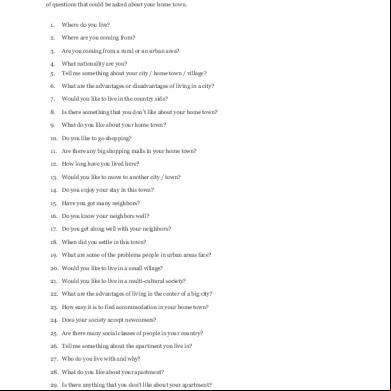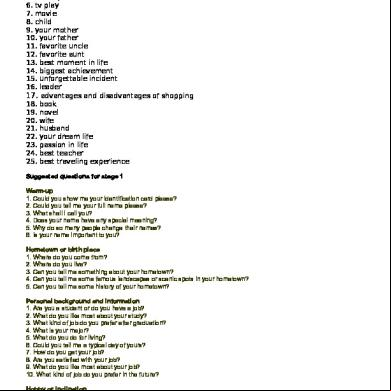Ielts Speaking Questions And Sample Answers 3x4z6h
This document was ed by and they confirmed that they have the permission to share it. If you are author or own the copyright of this book, please report to us by using this report form. Report l4457
Overview 6h3y3j
& View Ielts Speaking Questions And Sample Answers as PDF for free.
More details h6z72
- Words: 934
- Pages: 3
IELTS Speaking Practice ©Copyright Hesheng International Service General Instructions 1. Format of Speaking Test
Total Time: 11 – 14 minutes
Part 1: 4 – 5 minutes, some general questions about yourself, your life and your interests Part 2: 3 – 4 min (including 1 min for preparation), in which you have to talk about a given topic (card as prompt for a talk (1-2min); try to organise the reply you give, and speak for at least 1 and a half minutes before answering any "finishing" questions. Part 3: 4 – 5min, a discussion of issues linked to the talk in Part 2. To test your ability to answer questions or prompts about a wider topic than in Part 2; requiring you to have a good general knowledge of the world and to be able to give your opinions and/or present your argument(s) in appropriate English.
2. Strategies: how to tackle speaking
Practise with a partner write out your answers and show them to an IELTS teacher, which is especially useful for Part 3 of the Speaking Test - which is concerned with more abstract ideas. give your answers in a variety of styles.
3. Criteria, i.e. How is speaking assessed:
Fluency and coherence Lexical resources Grammatical range and accuracy Pronunciation
Speaking Sample Questions and Answers (for pre-intermediate candidates) A: What is your name, please? B: My full name is Yu Jinnuan. My English name is Peter. A: How do you assess the importance of computers? B: Hmm, this is really a hard question. You know, I am a worker, a welder in a factory. I have been dealing with tools and machines. So I am not familiar with things like this. But I would think computer is very important in our life. This is because everybody uses the computer for their work and study, as well as for their daily life. For example, … A: How often do you go to parks or public gardens? B: Very often. I usually go every day. This is because I like parks and gardens. We can do exercises, have picnics, barbecues, and other activities. (Not very often, because I have to work and I don’t have much time to go to parks and gardens.) A: How important do you think education is for children these days? B: Quite important, because if you don’t have good education, you cannot have a good job, and you won’t have a bright future.
A: How do you like outdoor activities? B: I like them very much. There are a number of reasons for this. First, when you do outdoor activities, you can enjoy the sunshine, the beautiful environment and the fresh air. Second, you can keep healthy and fit. Thirdly, you can also make some friends there. (No, not much/ I don’t quite like those activities, because I enjoy staying indoors watching movies, playing computer games, listening to music. Besides, I don’t have much time). Describe a house you want to have in the future. There are many houses I like, such as houses with many bedrooms, or a big yard, or houses with modern facilities. But the one I like best is … / my favourite is …/ I want to talk about today is a house with a swimming pool. The house should be big enough for my family, with at least 4 bedrooms. It would be better if the house is located near the sea, so I can go swimming or fishing with my family when I am free. Also, the house should have a large garden for the children to play in. And if we have a swimming pool, they can learn swimming at home. That is all I have to say about this topic. Other patterns: There are many … I like. Some are …, others are …, but the one I like best is … I have many …. Some are …, others are… but the one I want to talk about today is …
4. Useful expressions
In my opinion, I would think that, I would say that, I believe, I trust, I reckon, I suppose, in my view, as far as I am concerned, I agree that, it is true that … I don’t think that …, I don’t agree with the view that … , I object to the view … Having said that, I would also like to say …
On the contrary, it is not true that, to my surprise, contrary to the fact, In general, generally speaking, Well, it depends. While some may think…, I would say … Oh, this is a hard question. This is because, on the one hand, … on the other, … As we mentioned earlier, … There are a number of reasons why I say so. First, …, second
For example, for instance, let me give you an example, let me illustrate the point with an example, In other words, to put it another way, let me express another way, let me rephrase this, that is to say, To be more precise, to be more specific, In comparison with, compared with, To tell you the truth, as a matter of fact, in fact, in reality, to be frank, frankly speaking, to be honest, (I beg your) pardon, excuse me, can you please say that again, excuse me, can you please clarify that, can you please explain it? In a word, in summary, in conclusion, to sum up, to conclude,
Total Time: 11 – 14 minutes
Part 1: 4 – 5 minutes, some general questions about yourself, your life and your interests Part 2: 3 – 4 min (including 1 min for preparation), in which you have to talk about a given topic (card as prompt for a talk (1-2min); try to organise the reply you give, and speak for at least 1 and a half minutes before answering any "finishing" questions. Part 3: 4 – 5min, a discussion of issues linked to the talk in Part 2. To test your ability to answer questions or prompts about a wider topic than in Part 2; requiring you to have a good general knowledge of the world and to be able to give your opinions and/or present your argument(s) in appropriate English.
2. Strategies: how to tackle speaking
Practise with a partner write out your answers and show them to an IELTS teacher, which is especially useful for Part 3 of the Speaking Test - which is concerned with more abstract ideas. give your answers in a variety of styles.
3. Criteria, i.e. How is speaking assessed:
Fluency and coherence Lexical resources Grammatical range and accuracy Pronunciation
Speaking Sample Questions and Answers (for pre-intermediate candidates) A: What is your name, please? B: My full name is Yu Jinnuan. My English name is Peter. A: How do you assess the importance of computers? B: Hmm, this is really a hard question. You know, I am a worker, a welder in a factory. I have been dealing with tools and machines. So I am not familiar with things like this. But I would think computer is very important in our life. This is because everybody uses the computer for their work and study, as well as for their daily life. For example, … A: How often do you go to parks or public gardens? B: Very often. I usually go every day. This is because I like parks and gardens. We can do exercises, have picnics, barbecues, and other activities. (Not very often, because I have to work and I don’t have much time to go to parks and gardens.) A: How important do you think education is for children these days? B: Quite important, because if you don’t have good education, you cannot have a good job, and you won’t have a bright future.
A: How do you like outdoor activities? B: I like them very much. There are a number of reasons for this. First, when you do outdoor activities, you can enjoy the sunshine, the beautiful environment and the fresh air. Second, you can keep healthy and fit. Thirdly, you can also make some friends there. (No, not much/ I don’t quite like those activities, because I enjoy staying indoors watching movies, playing computer games, listening to music. Besides, I don’t have much time). Describe a house you want to have in the future. There are many houses I like, such as houses with many bedrooms, or a big yard, or houses with modern facilities. But the one I like best is … / my favourite is …/ I want to talk about today is a house with a swimming pool. The house should be big enough for my family, with at least 4 bedrooms. It would be better if the house is located near the sea, so I can go swimming or fishing with my family when I am free. Also, the house should have a large garden for the children to play in. And if we have a swimming pool, they can learn swimming at home. That is all I have to say about this topic. Other patterns: There are many … I like. Some are …, others are …, but the one I like best is … I have many …. Some are …, others are… but the one I want to talk about today is …
4. Useful expressions
In my opinion, I would think that, I would say that, I believe, I trust, I reckon, I suppose, in my view, as far as I am concerned, I agree that, it is true that … I don’t think that …, I don’t agree with the view that … , I object to the view … Having said that, I would also like to say …
On the contrary, it is not true that, to my surprise, contrary to the fact, In general, generally speaking, Well, it depends. While some may think…, I would say … Oh, this is a hard question. This is because, on the one hand, … on the other, … As we mentioned earlier, … There are a number of reasons why I say so. First, …, second
For example, for instance, let me give you an example, let me illustrate the point with an example, In other words, to put it another way, let me express another way, let me rephrase this, that is to say, To be more precise, to be more specific, In comparison with, compared with, To tell you the truth, as a matter of fact, in fact, in reality, to be frank, frankly speaking, to be honest, (I beg your) pardon, excuse me, can you please say that again, excuse me, can you please clarify that, can you please explain it? In a word, in summary, in conclusion, to sum up, to conclude,










